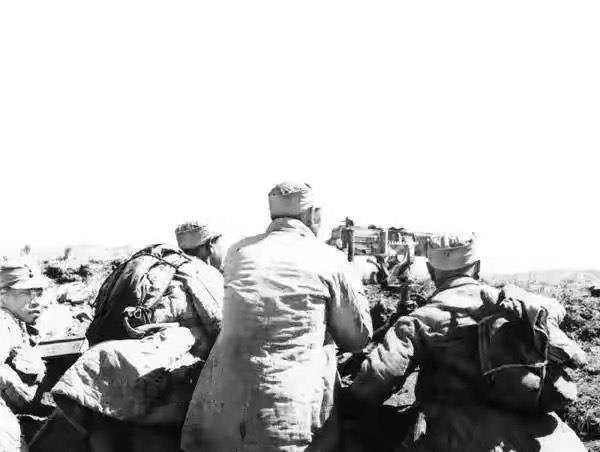In the anti-war movies and TV series, we can see many absurd storylines, such as "hand tearing devils", "bun grenades", "grenades blowing up airplanes" and so on.
This article is about the story of an anti-Japanese "soldier king", in which many extraordinary heroic feats have occurred, and if there is no authoritative institution to support it, it is easy to be regarded as another "divine drama".

This anti-Japanese "soldier king" was named Lü Junsheng, a native of Xingtai, Hebei Province, and on the big red list of "350 National Combat Heroes" published by the Central Military Commission, Lü Junsheng ranked first in the North China Military Region.
Like many combat heroes, Lü Junsheng did not have a very high position, so he did not command large battles and sweep thousands of armies, but they all had a characteristic, almost every hero was a well-known "soldier king".
Lü Junsheng joined the army in December 1937 and successively served as a soldier, captain, company commander, deputy battalion commander and other positions, and was awarded eight first-class merits.
Lü Junsheng was about 1 meter 92 tall, with a large body and a large waist, which was particularly conspicuous and eye-catching among the soldiers of the Eighth Route Army who were generally thin and small.
Compared with Lu Junsheng and "Little Japan", the physical disparity is even greater.
When fighting with the Japanese with the bayonet, Lu Junsheng took advantage of the advantage, he was tall and long-armed, and his strength was infinite, usually, the Japanese had not yet gotten close to his body, and he became his "ghost under the knife".
In July 1938, Lü Junsheng's 4th Company of the 2nd Regiment of the 129th Division's EastWard Column encountered a Japanese unit in Shandong.
After running out of bullets, the company commander shouted, "Get on the bayonet!" ", took the lead and fought with the Japanese army to open the bayonet.
At this time, Lü Junsheng was not afraid, and he took up his bayonet rifle and rushed up.
With his unique advantage, Lü Junsheng rushed into the enemy group, slashed left and right, stabbed one knife at a time, and stabbed twenty-seven Japanese soldiers in a row.
The Japanese soldiers were first frightened by this big Chinese soldier, and then several people besieged Lü Junsheng together, so Lü Junsheng was also stabbed three times by the Japanese army.
Since then, Lü Junsheng became famous in one battle, and such a glorious battle record made him famous, and he was awarded the first class combat hero by his superiors, becoming an out-and-out "soldier king".
The entire eastward column of the Eighth Route Army knew that there was a tall warrior, who was infinitely powerful and had a first-class level of bayonet fighting.
Another special skill of "Soldier King" Lü Junsheng is to throw grenades.
Because the "Soldier King" has a superior arm span and great strength, the grenade can also be thrown far and wide.
When he first joined the army, because the grenade was thrown far, the company commander asked Lü Junsheng to practice the accuracy of the bomb throwing more, and as a result, after a stage, Lü Junsheng trained into a "god pitcher".
In one battle after another, Lü Junsheng is like an active "mortar", grenades are like shells, Lu Junsheng can basically do "where to fight", showing great might.
Speaking of Lu Junsheng, there is another story that people talk about.
In 1940, Lü Junsheng led the team to participate in the famous Hundred Regiments Battle, and when attacking Gaoyi, the company he led served as a frontal attack.
After the company blew up the Japanese perimeter, it was suppressed by machine gun fire in a bunker, and the advance of the troops was blocked.
At the critical moment, Lü Junsheng appeared in front of the Japanese bunker, only to see him reach out and grab the hot barrel of the Japanese machine gun, and forcefully snatch the Japanese machine gun from the shooting hole, and the troops took the opportunity to quickly break through.
After the founding of the People's Republic of China, Lü Junsheng, as a representative of the fighting heroes of North China, was received by the chairman and the central leaders.
Because Lü Junsheng was wounded a lot in the war and withdrew from the army soon after, the "King of Soldiers" Lü Junsheng regrettably missed the award.
Historically, the birth and departure of heroes will be different and earth-shattering.
Lu Junsheng died suddenly and left the world, and the story is very legendary.
On the evening of November 22, 1970, Lu Junsheng was watching a movie in the village.
This is a war film, Lü Junsheng obviously entered the role, when the battle situation was tight, Lü Junsheng clenched his fists with both hands and his brows were locked; when our army launched a charge on the screen, Lü Junsheng clapped his hands and applauded!
When the scene of our army's victory appeared on the screen, Lu Junsheng was extremely excited, laughed, and suddenly fell down on his back.
Because of a sudden heart attack, Comrade Lu Junsheng regrettably died early, that year, he was only 63 years old.
Comrade Lü Junsheng, the legendary hero and "King of Soldiers", was buried in the Martyrs' Cemetery of the North China Military Region.
During the War of Resistance Against Japan, our army also had a large number of heroic and invincible "soldier kings", who were unknown, but their feats were epic and real.
It is a pity that many of today's "divine dramas" do not dig up the real and touching stories of the "Soldier Kings", but instead do not hesitate to make up nonsense and fool young audiences.
Respecting history and remembering heroes and martyrs is the responsibility and obligation of future generations.
Anti-Japanese heroes, immortal!